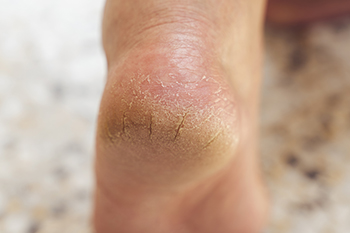
Cracked heels are a common foot condition characterized by dry, thickened skin that develops fissures around the edges of the heel. Common causes include prolonged standing, improper footwear, dry skin, and underlying health issues such as diabetes or eczema. Symptoms often include visible cracks, rough skin, discomfort, and sometimes bleeding or pain. If left untreated, cracked heels can lead to infections and more serious complications. Treatment involves moisturizing the feet regularly, using exfoliating scrubs to remove dead skin, and wearing supportive shoes to alleviate pressure. A podiatrist can provide specialized care, offering treatments such as professional debridement, customized orthotics, and tailored advice on foot care routines. If you are struggling with cracked heels, consulting a podiatrist is suggested. They can accurately assess your condition and develop a personalized treatment plan to restore your foot health.
Cracked heels are unsightly and can cause further damage to your shoes and feet. If you have any concerns, contact Keleigh Muxlow, DPM from Colorado. Our doctor can provide the care you need to keep you pain-free and on your feet.
Cracked Heels
Cracked heels appear unappealing and can make it harder for you walk around in sandals. Aside from looking unpleasant, cracked heels can also tear stockings, socks, and wear out your shoes. There are several methods to help restore a cracked heel and prevent further damage.
How Do You Get Them?
Dry skin is the number one culprit in creating cracked heels. Many athletes, walkers, joggers, and even swimmers suffer from cracked heels. Age and skin oil production play a role to getting cracked heels as well.
Promote Healing
Over the counter medicines can help, especially for those that need instant relief or who suffer from chronic dry feet.
Wear Socks – Wearing socks with medicated creams helps lock in moisture.
Moisturizers – Applying both day and night will help alleviate dryness which causes cracking.
Pumice Stones – These exfoliate and remove dead skin, which allows for smoother moisturizer application and better absorption into the skin.
Change in Diet
Eating healthy with a well-balanced diet will give the skin a fresh and radiant look. Your body responds to the kinds of food you ingest. Omega-3 fatty acids and zinc supplements can also revitalize skin tissue.
Most importantly, seek professional help if unsure how to proceed in treating cracked heels. A podiatrist will help you with any questions or information needed.
If you have any questions, please feel free to contact our office located in Littleton, CO . We offer the newest diagnostic and treatment technologies for all your foot care needs.
